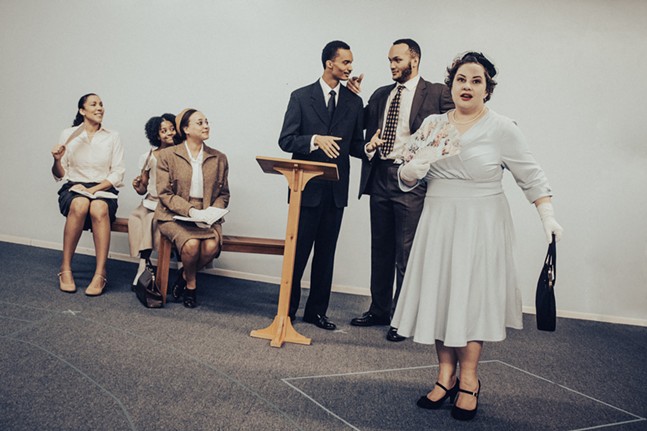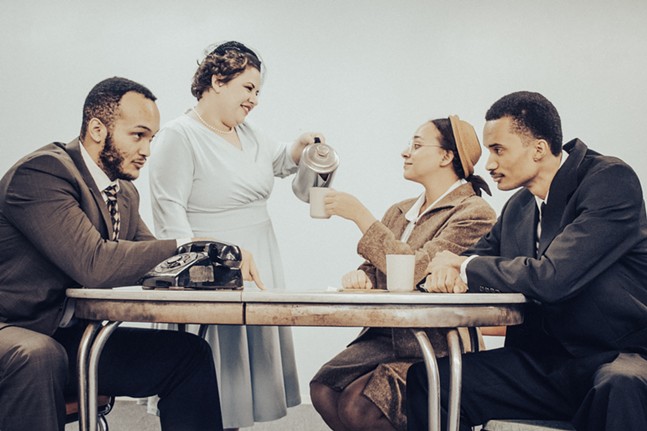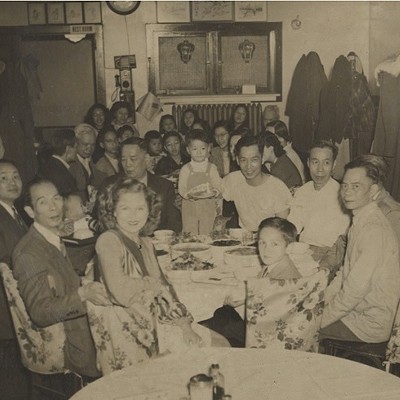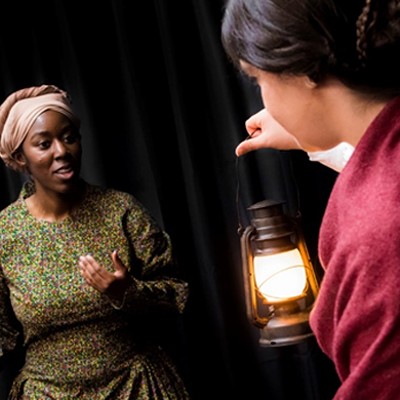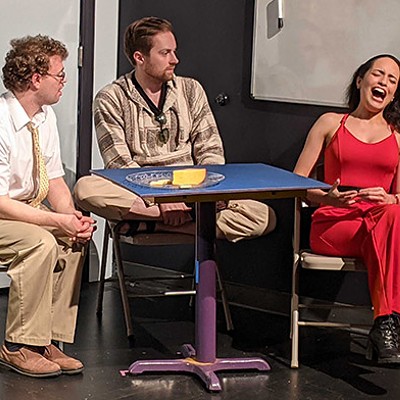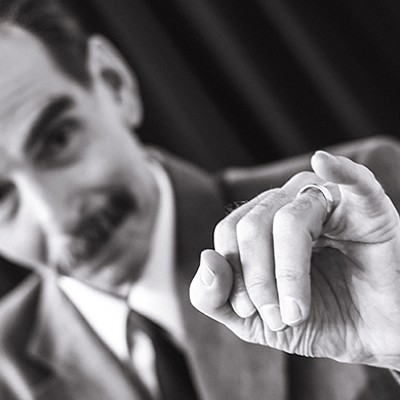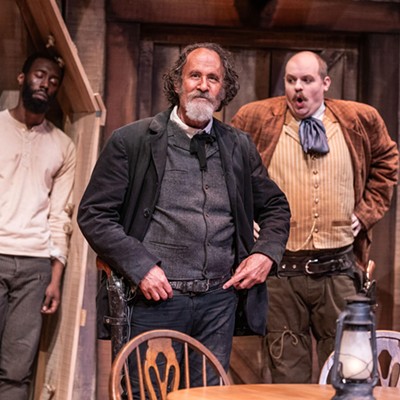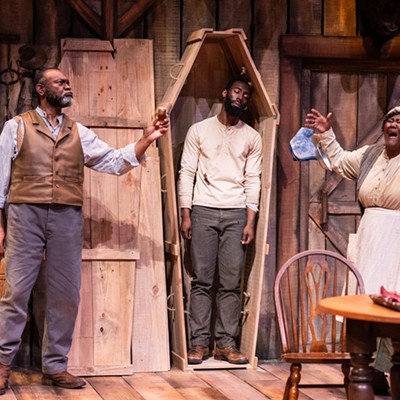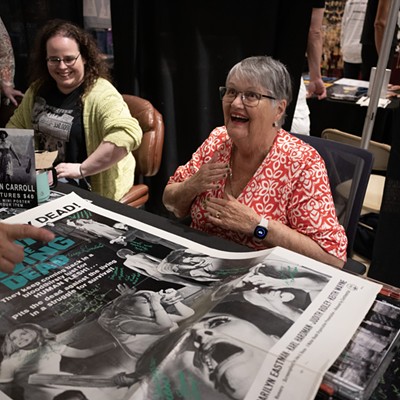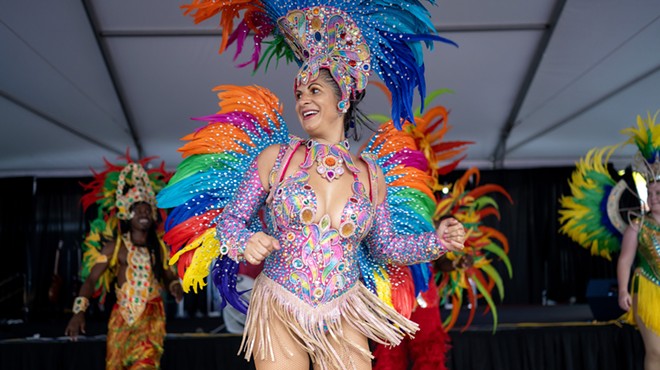Prime Stage depicts Rosa Parks as more than the bus boycott
[
{
"name": "Local Action Unit",
"component": "24929589",
"insertPoint": "3",
"requiredCountToDisplay": "1"
}
]
Most Americans know the basic story of civil rights activist Rosa Parks and the historic Montgomery, Ala. bus boycott. On Dec. 1, 1955, 42-year-old Parks boarded a city bus — at that time segregated by law — and politely refused to surrender her seat to a white passenger. Parks was arrested and stood trial, starting a city-wide bus boycott protesting segregation, bringing Dr. Martin Luther King Jr. — then a young Montgomery pastor — to the fore, and catalyzing a nationwide civil rights movement.
Prime Stage Theatre portrays these events in an upcoming production of Rosa Parks and the Montgomery Bus Boycott, written by Sue Greenberg, and staging at the New Hazlett Theater from Fri., Jan. 19-Sun., Jan. 28 (tickets available online). The run also includes a sensory-friendly performance on Sat., Jan. 27.
Additionally, during the weekends of Sat., Jan. 20-Sun., Jan. 21 and Sat., Jan. 27-Sun., Jan. 28, theatergoers can visit the nearby Children’s Museum of Pittsburgh MuseumLab for a behind-the-scenes look at sets and costumes curated by Prime Stage’s production team.
The first thing director Linda Haston wants audiences to know about the play is, “You can expect more than just Rosa Parks and the bus.”
“It reveals more in-depth coverage as to her background,” Haston tells Pittsburgh City Paper. “How instrumental she was in the entire movement, not just the bus.”
According to a press release, the production highlights Prime Stage Theater’s 27th season of Courage and Discovery (which includes a forthcoming show about Anne Frank) and is part of its third Sprouts Series, the goal of which is to “bring literature to life” for families and children as young as 8.
But Haston tells City Paper the play is for all ages as “a lot of adults do not know the background behind this entire movement.”
Several myths surround Parks’ act of protest, and Haston points out that it was not spontaneous — instead carefully planned by the NAACP where Parks was an officer. Nor was Parks the first activist to stage a Montgomery bus sit-in. (Notably, before Parks' act of protest, 15-year-old Claudette Colvin refused to give up her seat and was also arrested. Unfortunately, her case failed to garner the same support because she became pregnant while unmarried before her trial.)
The upcoming Prime Stages production expands the well-trod story and examines notions of respectability, particularly as they applied to Parks herself.
“When they chose her to represent the Black community in the civil rights movement and in the boycott, they mistakenly thought she was this kind, quiet, church-going woman who would do anything they would instruct her to do,” Haston tells CP, noting that Parks also faced male chauvinism. “Mistakenly [they thought] that she was perfect, a woman of the times … But little did they know anything about her … She went above and beyond that.”
Audiences can expect a “fabulous” performance by actress Chelsea Davis who portrays Parks, Haston says. As director, she took care to cast someone who could truly “embody” the icon and would be “as close to [Parks'] likeness as possible.”
Haston says people assume Parks was an older woman at the time of the boycott, largely because “most people [didn’t] see her or really get to know her until she received accolades” much later in her life when she was dubbed "the first lady of civil rights" and "the mother of the freedom movement." Parks died in 2005 at 92.
According to Haston, Parks came to “hate” being posed for photos on a bus, “looking out the window, as if that's all there was to her.”
The play’s ensemble cast instead shows the full scope of Parks' involvement in the larger civil rights movement with actors playing King (Jaco Wright) and Edgar “E.D.” Nixon (Nick Page), another prominent civil rights leader and a union organizer who played a pivotal role in the bus boycott. Also portrayed is Virginia Foster Durr, a friend of Parks’ who led Montgomery's only interracial political organization “to the peril of her being ostracized by her race,” Haston says.
A “very minimal set” encourages an immersive experience. “It doesn’t become a lecture or history lesson,” Haston says. “You're going to feel as if you’re actually there in the movement.”
Artistic director Dr. Wayne Brinda commented that knowing Parks' story is one thing, "but seeing these pivotal historical moments portrayed onstage brings new depth and understanding to the people and their time.”
Ultimately, Haston says, these events are not the distant past, but still present and shaping history.
“The [Montgomery] boycott lasted for a year, but the civil rights movement, it's still going on,” Haston says. “And people today stand on the shoulders of these people who began it.”
Prime Stage Sprouts presents Rosa Parks and the Montgomery Bus Boycott. Fri., Jan. 19-Sun., Jan. 28. New Hazlett Theater. Six Allegheny Square East, North Side. $14-24. primestage.com
Prime Stage Theatre portrays these events in an upcoming production of Rosa Parks and the Montgomery Bus Boycott, written by Sue Greenberg, and staging at the New Hazlett Theater from Fri., Jan. 19-Sun., Jan. 28 (tickets available online). The run also includes a sensory-friendly performance on Sat., Jan. 27.
Additionally, during the weekends of Sat., Jan. 20-Sun., Jan. 21 and Sat., Jan. 27-Sun., Jan. 28, theatergoers can visit the nearby Children’s Museum of Pittsburgh MuseumLab for a behind-the-scenes look at sets and costumes curated by Prime Stage’s production team.
The first thing director Linda Haston wants audiences to know about the play is, “You can expect more than just Rosa Parks and the bus.”
“It reveals more in-depth coverage as to her background,” Haston tells Pittsburgh City Paper. “How instrumental she was in the entire movement, not just the bus.”
According to a press release, the production highlights Prime Stage Theater’s 27th season of Courage and Discovery (which includes a forthcoming show about Anne Frank) and is part of its third Sprouts Series, the goal of which is to “bring literature to life” for families and children as young as 8.
But Haston tells City Paper the play is for all ages as “a lot of adults do not know the background behind this entire movement.”
Several myths surround Parks’ act of protest, and Haston points out that it was not spontaneous — instead carefully planned by the NAACP where Parks was an officer. Nor was Parks the first activist to stage a Montgomery bus sit-in. (Notably, before Parks' act of protest, 15-year-old Claudette Colvin refused to give up her seat and was also arrested. Unfortunately, her case failed to garner the same support because she became pregnant while unmarried before her trial.)
The upcoming Prime Stages production expands the well-trod story and examines notions of respectability, particularly as they applied to Parks herself.
“When they chose her to represent the Black community in the civil rights movement and in the boycott, they mistakenly thought she was this kind, quiet, church-going woman who would do anything they would instruct her to do,” Haston tells CP, noting that Parks also faced male chauvinism. “Mistakenly [they thought] that she was perfect, a woman of the times … But little did they know anything about her … She went above and beyond that.”
Audiences can expect a “fabulous” performance by actress Chelsea Davis who portrays Parks, Haston says. As director, she took care to cast someone who could truly “embody” the icon and would be “as close to [Parks'] likeness as possible.”
Haston says people assume Parks was an older woman at the time of the boycott, largely because “most people [didn’t] see her or really get to know her until she received accolades” much later in her life when she was dubbed "the first lady of civil rights" and "the mother of the freedom movement." Parks died in 2005 at 92.
According to Haston, Parks came to “hate” being posed for photos on a bus, “looking out the window, as if that's all there was to her.”
The play’s ensemble cast instead shows the full scope of Parks' involvement in the larger civil rights movement with actors playing King (Jaco Wright) and Edgar “E.D.” Nixon (Nick Page), another prominent civil rights leader and a union organizer who played a pivotal role in the bus boycott. Also portrayed is Virginia Foster Durr, a friend of Parks’ who led Montgomery's only interracial political organization “to the peril of her being ostracized by her race,” Haston says.
A “very minimal set” encourages an immersive experience. “It doesn’t become a lecture or history lesson,” Haston says. “You're going to feel as if you’re actually there in the movement.”
Artistic director Dr. Wayne Brinda commented that knowing Parks' story is one thing, "but seeing these pivotal historical moments portrayed onstage brings new depth and understanding to the people and their time.”
Ultimately, Haston says, these events are not the distant past, but still present and shaping history.
“The [Montgomery] boycott lasted for a year, but the civil rights movement, it's still going on,” Haston says. “And people today stand on the shoulders of these people who began it.”
Prime Stage Sprouts presents Rosa Parks and the Montgomery Bus Boycott. Fri., Jan. 19-Sun., Jan. 28. New Hazlett Theater. Six Allegheny Square East, North Side. $14-24. primestage.com

